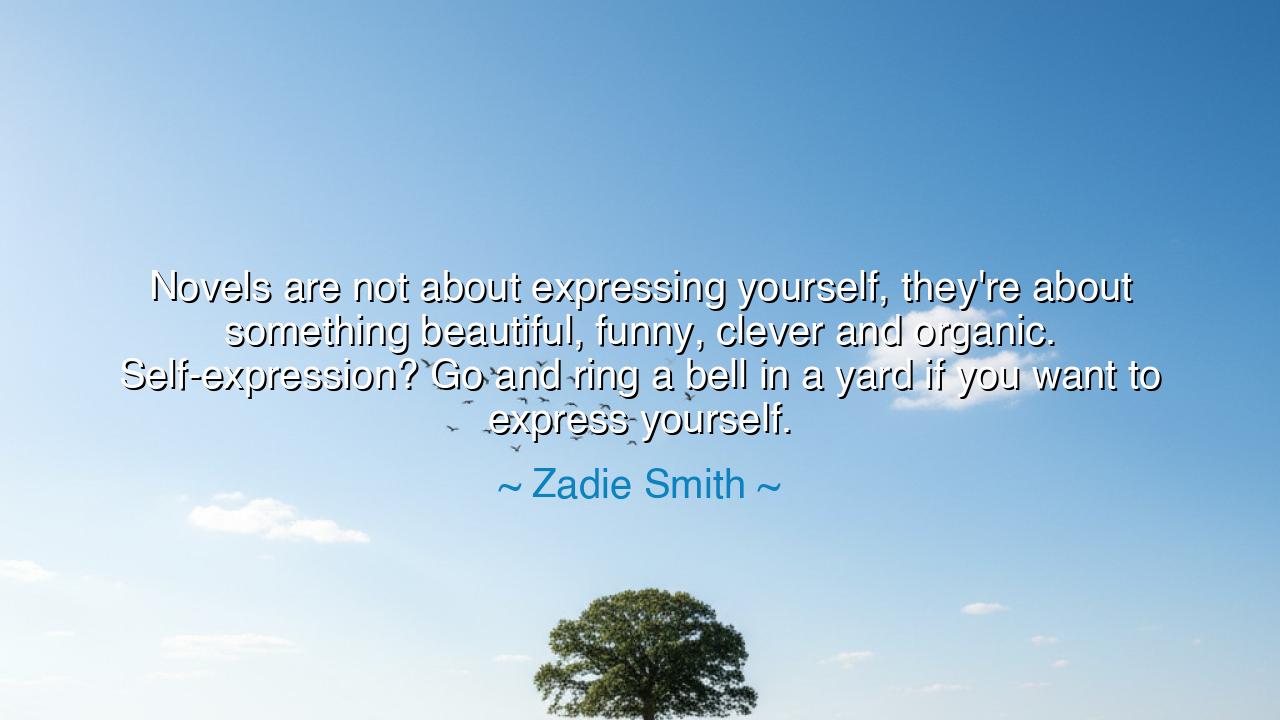
Novels are not about expressing yourself, they're about something
Novels are not about expressing yourself, they're about something beautiful, funny, clever and organic. Self-expression? Go and ring a bell in a yard if you want to express yourself.






“Novels are not about expressing yourself, they're about something beautiful, funny, clever and organic. Self-expression? Go and ring a bell in a yard if you want to express yourself.” — so spoke Zadie Smith, a writer whose mind is both sharp and tender, whose prose flows like the voice of a modern oracle. In this bold and uncompromising statement, she shatters one of the sweetest illusions of the age: that art exists merely as a mirror for the self. Her words are not cruel; they are clarifying. She reminds us that the novel, that ancient vessel of storytelling, is not a diary of emotion but a living organism — a world unto itself, born not from ego, but from wonder.
To say that novels are not about self-expression is to call the artist to a higher purpose. The ancients would have understood this instinctively. For them, art was never merely personal; it was sacred. The poet did not write to reveal himself, but to serve the Muse, the divine whisper that spoke through him. When Homer sang of Achilles, he did not say, “Here is how I feel,” but rather, “Sing, O Muse, the wrath of Achilles.” The artist was a vessel, not the flame. Zadie Smith’s defiance of “self-expression” returns us to this forgotten reverence — that true creation begins when the self is set aside, and something larger, beautiful, funny, clever, and organic, begins to breathe through the artist’s hands.
Her words strike like the philosopher’s hammer, not to destroy the self, but to hollow it — to make space for the truth of the story itself. For when one writes only to express, the work shrinks to the size of one’s own heart. But when one writes to discover, to serve beauty and meaning beyond the self, the work expands to touch eternity. In the ancient temples of Greece, sculptors prayed before carving marble, believing the statue already existed within the stone. Their task was not to impose their will, but to reveal what was already there. So too does Zadie Smith tell the writer: the novel is not your confession — it is your discovery.
The phrase “ring a bell in a yard” glows with humor and challenge. It is her way of saying, “If what you seek is release, not creation, find another instrument.” The ringing of a bell is a cry, an outburst, a momentary relief of tension. But art is not a cry — it is a composition. It is the difference between shouting into the void and shaping sound into symphony. The ancients spoke of this difference as the line between chaos and cosmos — between raw energy and order that gives life. Smith’s command is therefore not cruel, but loving. She calls the artist away from indulgence toward discipline, away from mere emotion toward form.
Consider the story of Michelangelo, who, when asked how he carved his statues, replied, “I saw the angel in the marble and carved until I set him free.” He did not say, “I expressed myself through the stone.” His art was not a projection of the self but a revelation of something deeper, something divine. In the same spirit, Zadie Smith’s philosophy reminds us that the novel is not a mirror but a window — not a reflection of the writer’s face, but a passage into the collective soul. It must live, breathe, and move on its own. Only then does it become organic, something that grows beyond its maker.
Her vision stands against the age of confession and spectacle, where every whisper of emotion demands an audience, and where art is too often mistaken for therapy. But Zadie Smith’s defiance is not against emotion — it is against the idol of ego. She seeks to restore the artist to their rightful place: not as performer, but as craftsman; not as self-revealer, but as world-builder. The beautiful, the funny, the clever, the organic — these are the marks of life itself, and they cannot be faked. They are born only when the artist’s vanity dissolves into service to the story.
And so, let this teaching be carried forward: Do not seek to express — seek to create. When you write, paint, sing, or build, do not ask, “What does this say about me?” but rather, “What truth is waiting to be born through me?” Learn from the ancients, who served their craft as priests served the temple. Learn from Zadie Smith, who reminds us that the self is not the goal of art, but the instrument through which art passes. For self-expression fades, but creation endures. Let your work be something more than your echo — let it be a world that lives, breathes, and outlasts you. Only then will it be truly beautiful, and only then will it be art.






AAdministratorAdministrator
Welcome, honored guests. Please leave a comment, we will respond soon